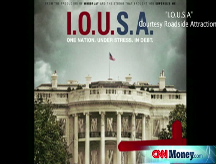Beware the $7,500 'tax credit'
The housing rescue credit may prod some new homebuyers. But the money must be repaid, and the program probably won't be enough to jump start housing market.
| 30 yr fixed | 3.80% |
| 15 yr fixed | 3.20% |
| 5/1 ARM | 3.84% |
| 30 yr refi | 3.82% |
| 15 yr refi | 3.20% |
NEW YORK (CNNMoney.com) -- Washington policy makers and housing industry insiders hope a new tax credit for first-time home buyers will get the moribund housing market moving again.
But most analysts agree that the program is more of a band-aid than a cure-all for the battered real estate market. What's more, others are quick to point out that the credit must be repaid, which means it's actually an interest-free loan that could get some homeowners in trouble.
"It's one of those things that are more complicated than it seems at first blush, said Allen Fishbein, director of housing and credit policy for the Consumer Federation of America. "Consumers have to make sure they understand the credit thoroughly.
The $7,500 credit is for people buying their first homes, and was passed as part of the Housing and Economic Recovery Act of 2008 and signed into law in July. To qualify for the full $7,500, individuals must earn less than $75,000 annually, while couples may earn up to $150,000. Individual buyers with income of up to $95,000 and couples with income up to $170,000 are eligible for a partial credit.
The Senate Finance Committee estimates that about 1.6 million people will use the credit.
The housing industry pushed for the program. "Breaking the log jam of unsold homes is something we are very much behind," said Richard Dugas, president of builder Pulte Homes, at a news conference to discuss the program. First time home buyers represented about 20% of the market for new homes in 2007.
Realtors are also behind the credit. "[It] will help chip away at inventory levels, stabilize prices and spur [sales] activity," said Richard A. Smith, CEO of Realogy, the parent company of both Coldwell Banker and Century 21.
The industry has had success with tax credits in the past. In 1975, Congress passed a $2,000 credit for home buyers (about $8,200 in today's dollars).
"Buyers flocked to market and cleared out a then-record inventory of homes," said NAHB president Sandy Dunn. But that credit did not have to be repaid.
And the impact should extend beyond first time home buyers, according to Lawrence Yun, chief economist for the National Association of Realtors. A boost in demand for starter homes means that those sellers will be able to trade up to bigger, more expensive places, and so on up the chain.
Buyers who have not owned a home in the past three years can take a tax credit worth 10% of a home's sale price, up to $7,500, whichever is smaller.
The credit is good for homes closed on after April 9, 2008 and before July 1, 2009, and can be taken on taxes filed during 2008 or 2009. Even buyers who bought a home before the bill passed, but after April 9, can claim the credit.
Unlike tax deductions, which only offset taxes by lowering taxable income, the tax credit is a straight dollar-for-dollar deduction of your tax bill. So a buyer who would ordinarily pay $8,000 in taxes would pay just $500.
It's also "refundable," which means if a buyer's taxes are less than $7,500, the government will send them a check for the difference. For example, if a couple's income generates a tax bill of $5,000, the government will refund all of that plus $2,500.
Buyers must start paying back the loan within two years, at a rate of no more than $500 a year for 15 years. When the the home is sold, any outstanding balance will be repaid from the profit; if it's sold at a loss and the difference will be forgiven.
And some argue that mortgage lenders will take the credit into consideration, making it easier for buyers to get a loan.
"[The $7,500 reserve] will make borrowers less likely to fall into default," said Ken Goldstein, an economist with the Conference Board, since it gives them a nest egg should they run into trouble. Still, that assumes that buyers will sock the $7,500 away rather than spend it.
Indeed, the credit comes with plenty of caveats from economists and industry analysts.
"It's not going to provide first-time home buyers with cash up front," said the Consumer Federation of America's Allen Fishbein. "You have to apply to get the credit after the fact. There's a delay before you get the financial advantage."
And there are concerns that borrowers may treat the credit as a windfall, spending it as if it doesn't have to be repaid.
"It may appear to be free money," said Fishbein. "Consumers have to have their eyes open about how this works."
Other economists caution that while the credit may be helpful, it's hardly a solution to the crisis.
"It will not turn things around," said Jared Bernstein, an economist with the Economic Policy Institute. "Given the economy, it will only push a precious few first-time home buyers over the edge right now."
Plummeting home prices will blunt any impact that the credit may have, according to Nicholas Retsinas, director of the Harvard University's Joint Center for Housing Studies. As far as he's concerned, the market is simply too soft right now for a modest measure like this to make a big difference.
"The challenge right now is as much willingness to buy as affordability," he said. "The market still has this psychological barrier because people think prices will be lower tomorrow. I don't think this can overcome that barrier." ![]()



